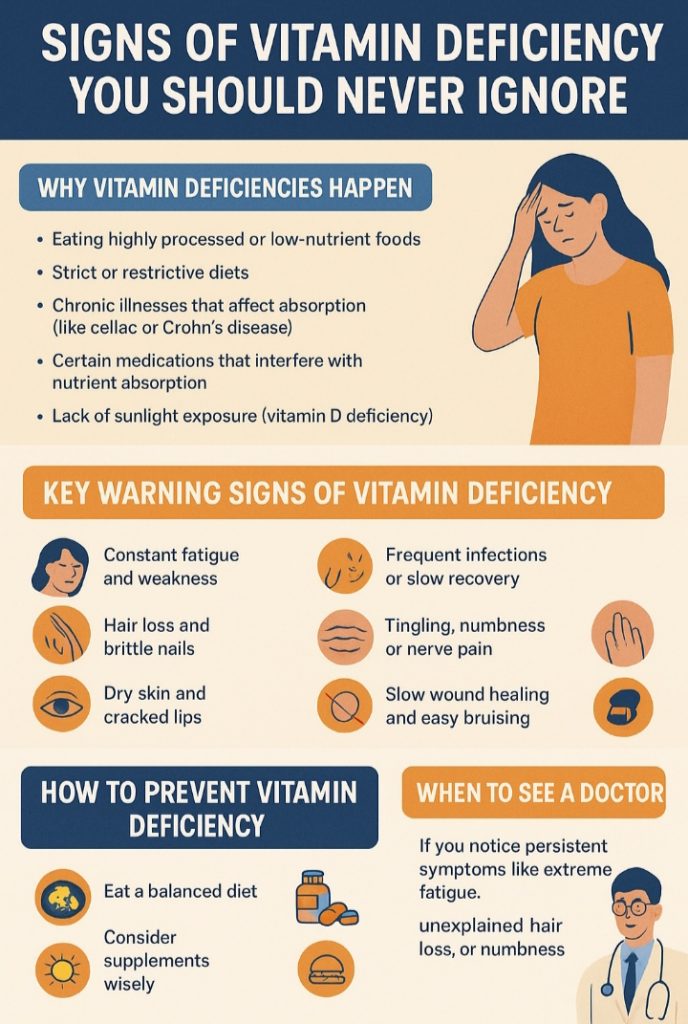Vitamins are essential nutrients your body needs to function at its best. From boosting immunity to keeping your skin glowing and your energy levels stable, vitamins are at the heart of good health. Unfortunately, many people suffer from vitamin deficiencies without realizing it. Poor diet, stress, medications, and chronic illnesses can all lead to nutrient shortages. Recognizing the early warning signs can help you address the issue before it becomes serious.
Why Vitamin Deficiencies Happen
Vitamin deficiencies occur when your body doesn’t get enough essential nutrients from food or supplements. Common reasons include:
Eating highly processed or low-nutrient foods
Strict or restrictive diets
Chronic illnesses that affect absorption (like celiac or Crohn’s disease)
Certain medications that interfere with nutrient absorption
Lack of sunlight exposure (vitamin D deficiency)
Understanding why deficiencies develop is the first step toward prevention.

Key Warning Signs of Vitamin Deficiency
- Constant Fatigue and Weakness
Feeling unusually tired or weak may indicate a shortage of vitamin B12, iron, or folate. These nutrients are crucial for producing red blood cells, which transport oxygen throughout your body. Without them, fatigue sets in quickly.
- Hair Loss and Brittle Nails
If your hair is thinning or your nails break easily, you may be lacking biotin (vitamin B7), zinc, or iron. These nutrients support cell growth and tissue repair, which are vital for healthy hair and nails.
- Dry Skin and Cracked Lips
Persistent dry skin, eczema-like patches, or cracked lips—especially at the corners—may indicate deficiencies in riboflavin (vitamin B2), niacin (vitamin B3), or vitamin E. These vitamins help keep your skin moisturized and protect against damage.
- Poor Night Vision or Dry Eyes
Vitamin A deficiency is one of the most common causes of vision problems. Symptoms include difficulty seeing in low light and chronic dry eyes. Adding beta-carotene-rich foods like carrots, sweet potatoes, and leafy greens can help.
- Frequent Infections or Slow Recovery
If you’re constantly catching colds or taking a long time to heal, your immune system might be compromised due to low vitamin C, vitamin D, or zinc levels. These nutrients play a crucial role in immune defense.
- Tingling, Numbness, or Nerve Pain
Pins-and-needles sensations in your hands or feet could signal a vitamin B12 deficiency. This vitamin is vital for nerve health, and prolonged deficiency may lead to nerve damage if untreated.
- Slow Wound Healing and Easy Bruising
Cuts that take too long to heal or unexplained bruising may indicate low vitamin C or vitamin K levels. These nutrients support collagen production and blood clotting—both essential for tissue repair.
ALSO READ: BREAKING: EFCC Arrests 19 Suspected Internet Fraudsters, a Lady Included [PHOTOS]
Other Subtle Signs to Watch Out For
Mood changes or depression: May be linked to low vitamin D or B12.
Bone pain or weakness: Often a sign of vitamin D deficiency.
Bleeding gums: Linked to low vitamin C.
Pale or yellowing skin: Can be associated with low vitamin B12 or iron.
How to Prevent Vitamin Deficiency
- Eat a Balanced Diet
Include a variety of fruits, vegetables, whole grains, lean proteins, and healthy fats. Foods like citrus fruits, leafy greens, fish, eggs, and nuts are rich in essential vitamins.
- Consider Supplements Wisely
If your doctor confirms a deficiency, supplements can help restore optimal levels. Always follow a healthcare provider’s advice before starting any new vitamins.
- Get Adequate Sunlight
Vitamin D, often called the “sunshine vitamin,” is synthesized when your skin is exposed to sunlight. Spending 15–30 minutes outdoors a few times a week can help maintain healthy levels.
- Limit Highly Processed Foods
Processed foods are often low in essential vitamins. Replace sugary snacks and fast food with nutrient-dense alternatives.
- Monitor Your Health Regularly
Routine blood tests can detect deficiencies early. People with chronic conditions or on strict diets should be especially vigilant.
When to See a Doctor
If you notice persistent symptoms like extreme fatigue, unexplained hair loss, or numbness, consult a healthcare professional. A simple blood test can confirm deficiencies, and early treatment can prevent long-term damage.
The Bottom Line
Vitamin deficiencies can silently impact your health, but being aware of the warning signs gives you the power to act. By eating a balanced diet, considering supplements when necessary, and getting regular check-ups, you can prevent deficiencies and maintain a healthier life.


